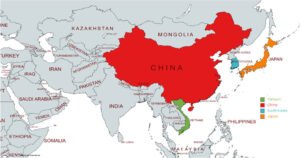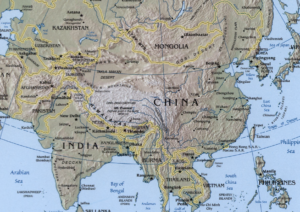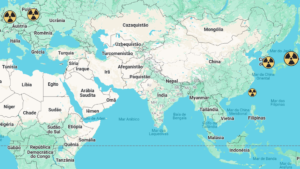- Among the main direct consequences, the end of the normalization of Arab countries with Israel is one of the clearest;
- There will also be possible consequences for the stability of neighboring countries such as Lebanon, Syria, and Iraq;
- A new major offensive in the Gaza Strip could also influence national elections in Europe and the United States.
The tension between Israel and Hamas in the Gaza Strip is a delicate topic with many nuances, which makes the conflict even more complex. The developments of this rivalry – which has been going on for decades – are observed with concern, which is why we make it clear that we will always condemn any and all types of deliberate attacks against civilians.
The objective of this article is not to take sides on any side, or point to any resolution to the war, given the complexity of the conflict, which involves several actors and multiple geopolitical interests at stake.
However, given Israel’s most recent declaration of war against Hamas, in October 2023, there is a need to analyze the potential geopolitical consequences and implications for the national policies of different countries.
This is the largest conflict involving Israel since the Yom Kippur War in 1973, which amplifies the relevance of an in-depth analysis of its developments. Therefore, the following are the potential geopolitical consequences of the current war between Israel and Palestine:

1. Postpone or derail the potential peace agreement between Israel and Saudi Arabia that was being negotiated by the United States
This possible diplomatic normalization agreement between Saudi Arabia and Israel negotiated together with the United States generated a lot of tension in the region, for this reason, it can be suggested that the October 2023 attacks by Hamas on Israel could be a direct response to undermine that plan.
This is because, if this plan follows the lines of the Abraham Accords detailed below, this diplomatic normalization would lead to a weakening of support for the Palestinian cause and could be replicated by other countries in the region, eventually making the creation of a Palestinian State unfeasible. This same agreement would reinforce the informal Arab-Israeli alliance against Iran. Therefore, it is speculated that Hamas may have received some type of support from the Iranian government to put this agreement in check.
In any case, Hamas’ plans in this regard were successful, as two weeks after the attacks, normalization between Israel and Saudi Arabia was completely paralyzed with no prospect of resuming while the conflict in Gaza continues. Even if the government in Riyadh still intends to return to the negotiating table, the great public opposition to the agreement due to the war in Gaza could make it unfeasible, at least in the short and medium term.
2. Test the strength of the Abraham Accords
The Abraham Accords, also known as the Abrahamic Covenants, are a series of agreements normalizing relations between Israel and several Arab and Muslim countries. These agreements were mediated by the United States and signed as of 2020. The name “Abraham Accords” is a reference to the biblical patriarch Abraham, who is considered an important spiritual leader in Abrahamic religions, including Judaism, Christianity and Islam.
The major Abrahamic Accords include:
- Israel-UAE Agreement: This was the first agreement announced in August 2020 and officially signed in September 2020. With this agreement, the UAE recognized Israel’s sovereignty and established full diplomatic relations.
- Bahrain-Israel Agreement: Announced in September 2020 and signed alongside the UAE agreement, this agreement led to Bahrain recognizing Israel and normalizing diplomatic relations.
- Israel-Sudan Agreement: Sudan agreed to normalize relations with Israel in October 2020, following the agreement between Israel and the United Arab Emirates.
- Israel-Morocco Agreement: Announced in December 2020, this agreement involved Israel and Morocco normalizing relations, with the United States recognizing Moroccan sovereignty over Western Sahara.
These agreements represented a significant change in the dynamics of the Middle East, as these Arab or Muslim countries previously had no formal diplomatic relations with Israel. The agreements aim to promote economic, cultural and diplomatic cooperation between nations and can have significant implications for the region in terms of peace and stability.
However, it is important to highlight that, despite the governments having signed these agreements, the majority of the populations of these countries maintain sympathy and support for the Palestinian cause.
This position ends up generating internal pressure, criticism and demonstrations against Israel and these agreements, since the Palestinian issue continues to be an important issue for many citizens of these countries.
Therefore, the leaders of these nations may face challenges in balancing geopolitical interests with the views and concerns of their populations regarding war, potentially putting the Abraham Accords at risk.
3. End the Arab-Israeli Alliance against Iran
The informal anti-Iranian coordination group, known as the Arab-Israeli Alliance or the Israeli-Sunni Coalition, operates in the Middle East with support from the United States.
This strategic collaboration has as its backdrop the regional security interests shared by Israel and the Sunni Arab nations led by Saudi Arabia, as opposed to Iranian interests in the region, resulting in the Iranian-Israeli and Iranian-Saudi conflicts.
The core of this alliance consists of the Gulf Cooperation Council states, which include Saudi Arabia, the United Arab Emirates and Oman, who work together unofficially to counter Iran’s influence.
However, given the pro-Palestinian stance of Arab citizens in the face of the Israeli-Palestinian war, it is believed that the durability of the Arab-Israeli Alliance against Iran will depend on the ability of the countries involved to balance their ideological biases, political interests, economies of each country, and local public opinion.
4. Contradictorily, enable the formation of the Palestinian State with the destruction of Hamas
In this context of the possibility of Hamas being destroyed by Israel, some of the possibilities that may arise are:
- Strengthened Palestinian Authority: With Hamas out of the picture, the Fattah-led Palestinian Authority that controls the West Bank would gain influence and control over the Gaza Strip. This could consolidate the Palestinian Authority’s power and governance in the region.
- Peace Negotiations: With Hamas weakened or eliminated, peace negotiations between Israel and the Palestinian Authority could resume with a greater chance of success. Israel may view the Fattah-led Palestinian Authority as a more moderate and reliable partner for these negotiations.
- Two-State Agreement: In the long term, this could lead to a two-state agreement, with the creation of a Palestinian State alongside Israel. This agreement would include issues such as borders, security, refugees, Jerusalem and other points of dispute.
- International Recognition: If an agreement were reached, the Palestinian State could be recognized internationally, which is a fundamental step for its legal and political existence.
However, it is crucial to emphasize that this reality includes many variables, interests, actors and obstacles that make resolving the Israel-Palestine conflict a considerable challenge.
The destruction of Hamas, in itself, does not guarantee the formation of the Palestinian State, but it can change political dynamics that eventually lead to a lasting peace agreement.
5. This attack could be negative for Netanyahu in Israel’s internal politics and could lead to his downfall as leader
The Hamas attack could be negative for Benjamin Netanyahu in Israel’s domestic politics for several reasons:
- Government weakening: The Israeli government under the leadership of Benjamin Netanyahu was already facing internal divisions and criticism due to allegations of corruption and weakening of the judiciary. The Hamas attack could widen fissures in the ruling coalition and further weaken the government’s political stability.
- Accountability: The Hamas attack raised questions about the Israeli government’s ability to predict and protect itself against these attacks, which is controversial as the Israeli army is considered one of the best armed forces in the world in terms of equipment, preparation and intelligence. This resulted in direct criticism of Netanyahu’s government and leadership. The government’s response to the threats and the way the situation is managed could negatively impact Netanyahu’s popularity.
- Protests and opposition: Israel had already seen significant protests against Netanyahu over several issues, including judicial reform proposed before the attack. The Hamas attack could increase demonstrations and domestic opposition to the government, making it more difficult for Netanyahu to maintain political cohesion.
6. Attract more global attention and support for the Palestinian cause
Theoretically, the Hamas attack could be positive for the Palestinians in the following ways:
- International attention: The conflict between Israel and Hamas often attracts the attention of the international community. Depending on how the international media presents the facts, this could raise global awareness of the plight of the Palestinians and promote sympathy for their cause.
- Regional solidarity: With the Palestinian cause in focus, solidarity between Palestinians and their supporters in the region can be strengthened, reaffirming their unity and determination in relation to the struggle for self-determination and an end to the Israeli occupation.
- Pressure for a solution: The conflict may increase pressure on Israel to seek a political solution to the Palestinian issue, involving negotiations and concessions. This could, theoretically, create opportunities for Palestinians to advance towards their political and territorial goals.
7. Destabilize Lebanon if the conflict involves Hezbollah
Lebanon is once again on alert as fears grow that it could become the second front in Israel’s fight against militant Islamic groups.
While attention is focused on Israel’s expected ground response in Gaza, Israeli forces have also declared a closed military zone along a 4-kilometer strip on Lebanon’s southern border, where they have engaged in clashes with Hezbollah, a political party Shia and militant group based in Lebanon.
There are concerns that Lebanon could become a second battleground in Israel’s war following the Hamas attack. Hezbollah has transferred elite units to the Golan Heights region, Syrian territory occupied by Israel, making it a volatile spot.
So far, border clashes appear to be contained, but the intensification of Iran’s regional influence is raising concerns that Tehran may be pressuring its proxy group – that is, an actor that acts on Iran’s behalf in certain cases or conflicts. – from the Shiite Islamic branch, Hezbollah, for a large-scale war.
Iranian Foreign Minister Hossein Amir-Abdollahian warned that if Israel does not halt its military campaign in Gaza, Hezbollah, a key player in the “axis of resistance” orchestrated by Tehran, is “ready” and has the “finger on the trigger”.
8. Rekindling the conflict in Syria
The persistent presence of Hezbollah and Iranian troops in Syria raises serious concerns of reigniting conflict in the region. They actively supported Bashar al-Assad’s government in the Syrian conflict, and now if they come into conflict with Israel, they may demand military support from Damascus in return for their past support.
The same is true of the Shia militias and experts from Iran who supported Damascus in Syrian civil war and could ask for the support of the Assad regime against Israel if necessary.
In this way, if Israel and Hezbollah enter into conflict in southern Lebanon, troops from Hezbollah, Iran, and the Syrian government itself could probably become involved militarily against Israel. In this case, American troops stationed in the Syrian Kurdistan region could also end up becoming involved on the Israeli side, increasing the complexity of the conflict.
9. Destabilize Iraq where there are Iranian militias
The case of Iraq is similar to that of Syria in terms of the presence in the country of Shiite militias supported by Iran. They are in the country because they supported the Baghdad government against the terrorists of the ISIS/Daesh group. However, in the case of Iraq, the relationship between Shiite militias and the official government of Iraq is not always positive as part of the population and local politicians see these militias as an external intervention by Iran in Iraq’s internal affairs.
Still, if Iran more openly supports Hamas in its conflict against Israel, these Iranian militias in Iraq could become involved in the war. There are already reports of columns of military vehicles crossing the border between Iraq and Syria and heading towards the Israeli border. American military bases inside Iraq would also be targeted in the event of a broader conflict in the region, which would also affect the stability of the fragile government in Baghdad.
10. Involve American troops in Syria and Iraq in the extended conflict
In addition to possible attacks by Iranian/Hezbollah proxies on American troops in Syria and Iraq, the American presence in the region alone could lead the US to become involved in the conflict in Gaza.
This is because the presence of US military troops in Iraq and Syria creates a scenario in which the US can become directly involved in the evolving conflict in the region. However, this is not the only variable that could lead the US to intervene. In addition to the military presence, the alliance with Israel and strategic interests in the region also play a significant role.
The presence of US forces in Iraq and Syria indicates a military commitment in the region. Furthermore, the US alliance with Israel establishes a defense commitment, which could result in US intervention in support of Israel if its security is threatened.
With the worsening of the Israeli-Palestinian war, and the possible resumption of the war in Syria, the US could intervene even more incisively. The region is vital in terms of global security, hosting important oil and natural gas transport routes, as well as being a center of geopolitical influence. Any development that threatens the stability of the region could have significant implications for US interests, resulting in US intervention.
However, this scenario of attacking American troops in Iraq and Syria is already a reality. When we were reviewing this article, news came out that on October 19th, some American bases in the region were targets of armed drone attacks that were claimed by local groups.
11. Benefiting Ukraine in the eyes of American Republicans for its support of Israel
The Ukrainian government’s quick declaration in support of Israel could have the following impacts on a certain wing of Republican voters in the United States who were not so in favor of Ukraine and had a certain sympathy for Moscow:
- Solidarity with Israel: Ukraine’s support for Israel during the conflict with Hamas demonstrates solidarity with one of the United States’ main allies in the Middle East region. Republicans have historically maintained unqualified support for Israel and, seeing Ukraine support Israel, may perceive Ukraine as a reliable ally.
- Concerns about Iran: Republicans generally take tougher stances on Iran due to concerns about its nuclear program and activities in the region. If there is evidence that Iran supported Hamas’ attack on Israel, it could strengthen the perception that Ukraine is aligned with Republican concerns about Iran also supplying weapons to Russia.
- Lobbying Connections: Israel has significant influence in the Republican Party through lobbying groups and campaign donations. If Ukraine demonstrates support for Israel and is seen as an ally in the region, these lobbying connections could translate into political and diplomatic support for Ukraine with Republicans.
- Aid bundling: The mention that Congress may bundle aid to Ukraine and Israel reflects a possible strategy to consolidate support for both countries. Republicans may see this approach as effective in strengthening bilateral relations and advancing their common interests.
Therefore, Ukraine’s support for Israel during the conflict with Hamas, coupled with perceived alignment toward Iran, could strengthen ties between Ukraine and American Republicans, potentially resulting in greater political and diplomatic support from the two major parties. Americans to Ukraine.
12. Damaging Russian image in relation to American conservatives due to their antagonism towards Israel and alliance with Iran
The strong relationship between the United States and Israel is an issue of great importance to many American conservatives. They see Israel as a crucial ally in the Middle East region, sharing of democratic values and common interests in areas such as security and stability.
Therefore, any action or stance perceived as unfavorable to Israel may be viewed with concern by this political group. Russia, in its regional relations, often finds itself on opposite sides of issues related to Israel, which could hurt its image among some American conservatives who have lately viewed Russia with less animosity.
Furthermore, Russia’s alliance with Iran is a source of distrust in conservative circles in the United States. Conservatives generally maintain tougher stances toward Iran, especially given concerns about Iran’s nuclear program and its activities in the region.
The perception that Russia is aligned with Iran on strategic issues can be seen as a stance that goes against the interests and concerns of American conservatives, even those who were more sympathetic to Moscow.
13. Potentially decrease American and European focus and resources to Ukraine at the same time
Israel’s war against Hamas in the Gaza Strip is having far-reaching implications for international relations, and Ukraine is not immune to these consequences.
As global attention focuses on the escalating conflict in the Middle East, there is a possibility that the war in Ukraine will be overshadowed and receive less attention and assistance from international actors, particularly the United States and the European Union.
Therefore, despite Kiev’s efforts to seek assistance and political support from Western nations, the focus on tensions in the Middle East could result in a reassessment of priorities and the redirection of diplomatic, humanitarian and military efforts.
Global competition for influence and political support can lead to implicit bargaining, where Ukrainian issues can be temporarily put on the back burner in exchange for cooperation or support in other areas.
However, this reduction in focus on Ukraine does not appear to be developing. For the first time on October 17, 2023, the United States authorized Ukraine to use the American long-range ATACMS missile against Russian troops, something that Kiev had been requesting since 2022. Furthermore, on October 19, President Biden did a statement in which he explained that he will ask Congress for around $100 billion in joint military aid for Ukraine and Israel.
These two recent developments could be a message to the international community that the US has not forgotten about Ukraine.
14. Hurting President Biden’s chances of re-election by Middle East instability and rising oil prices
The current instability in the Middle East could have significant implications for the possible re-election of President Biden in the United States and a possible return of former President Trump to the White House. Several factors deserve attention in this context:
- Perception of Weakness and Lack of Leadership: In a scenario of worsening instability in the region, the way the United States responds to these challenges could have serious domestic repercussions. In international politics, a leader’s ability to manage effectively in crises is often used as an indicator of leadership. If US actions are seen as vacillating or ineffective, criticism of weakness and lack of leadership is likely to emerge, something that has historically harmed sitting presidents.
- Impact on Foreign Policy: Escalating instability in the Middle East may force the US government to redirect resources and attention to issues in the region. This could divert focus from other foreign policy priorities, such as relations with Russia and China, or domestic issues. Voters often worry when they realize that resources and efforts are being diverted to international crises.
- Economic Challenges: The Middle East region is crucial to the global energy market, and instability in the area could result in higher oil prices and potential disruptions in energy supplies that would lead to higher inflation. Given that the economy is a primary concern for voters, any negative economic impacts arising from these events could have significant political implications.
Therefore, in an election year, it is to be expected that external events and the domestic economy – perhaps shaped by these events – will play a fundamental role in your image before voters.
15. Show that China is not ready to lead the world by its reluctance to take a stand in the conflict
Chinese leader Xi Jinping took almost two weeks to make his first public comments on the Israel-Hamas conflict. His statement emphasized the importance of a two-state solution to the conflict, as well as calling for a quick ceasefire to avoid a humanitarian crisis. In the meantime, Xi’s delay in speaking reflects China’s cautious stance on sensitive international issues.
The United States, on the other hand, acted quickly to demonstrate its support for Israel and its concern about the conflict. President Joe Biden traveled to Israel in a show of solidarity and reaffirmed the US commitment to the country’s security. This action was taken quickly, despite the risks associated with the escalation of the conflict.
Furthermore, the US sent two naval strike groups with two aircraft carriers to the conflict region. Obviously this show of force is intended to defend US interests in the region but also to intimidate other actors such as Hezbollah and Iran from getting involved in the conflict in Gaza. On the other hand, there was no movement of troops by Beijing inside or outside the region.
This difference in response reflects the two nations’ distinct approaches to the Israel-Hamas conflict and international politics in general. China seeks to maintain its image as a neutral mediator and does not explicitly align itself with any of the sides involved. The United States, on the other hand, has a historic alliance with Israel and is willing to show support.
This delay in China’s response could raise questions about its readiness to lead on the international stage, particularly in sensitive conflict situations where swift action is often necessary to avoid dangerous escalations. As China seeks a global leadership role, its more cautious approach may limit its ability to play a proactive and influential role in global issues.
16. Increase anti-immigration sentiment in Europe due to commemorations of terrorist acts
Hamas’ attacks on Israel and the celebration of these attacks by some pro-Israeli migrant groups in Europe have the potential to increase anti-immigrant sentiment in the region.
This is because acts of terrorism fuel feelings of insecurity and fear among the population. With this in mind, political groups and nationalist movements may exploit these incidents to promote more restrictive immigration policies.
This question also brings up the debate about multiculturalism in Europe. Multiculturalism, which promotes the coexistence of different ethnic and cultural groups, can be questioned in the face of terrorist acts.
The presence of isolated or radicalized communities can lead to discussions about the effectiveness of multiculturalism as a policy. Some argue that multiculturalism can lead to the creation of cultural ghettos that do not integrate well into the host society, creating fertile ground for extremism.
However, it is important to emphasize that blaming immigration as a whole or multiculturalism for acts of terrorism is an excessive and unfair simplification of reality.
Most immigrants are peaceful and contribute positively to their host societies. The relationship between terrorism, immigration and multiculturalism is complex and requires careful analysis, taking into account a range of factors, including integration, security policies and social conditions.
17. Lead extreme right-wing political parties to leadership in Europe, weakening the European Union, pro-environment policies, and migration policies
Israel’s war against Hamas also has the potential to propel far-right political parties to leadership in Europe, which in turn could weaken the European Union (EU) and negatively influence its environmental and migration policies.
As already mentioned above, the celebration of Hamas terrorist attacks by some immigrant minorities in Europe may widen the gap between local communities and immigrants, fueling anti-immigrant sentiments. This could strengthen far-right political parties that exploit these sentiments to gain electoral support.
These parties often have a skeptical stance towards the EU and its immigration policies. If they come to power, they may pursue more restrictive immigration policies and weaken European cooperation in this area, making EU migration policies more fragmented and less effective.
Furthermore, far-right parties are often critical of environmental policies, arguing that these policies harm the economy. If they take more control in European countries, they could weaken the EU’s commitment to environmental protection and the fight against climate change.
Final considerations
In times of increasing global interconnectivity, the war between Israel and Hamas serves as a shocking example of the countless threads that intertwine international relations.
The war taking place in the Middle East has the potential to reverberate throughout the world, shaping political, geopolitical, immigration and environmental agendas, in addition to echoing in global leadership issues.
Some of the potential consequences mentioned above may never occur. Others may occur in an even more intense way than we anticipated. Furthermore, there are also potential geopolitical consequences or consequences in specific countries that we did not even foresee two weeks after the start of the conflict in Gaza. Therefore, the list above cannot be considered a complete list.
Regardless of the potential consequences, this conflict also highlights the urgent need for a balanced, long-term approach by the international community to sensitive issues. The future requires effective cooperation, global governance, and diplomacy to face the global challenges that intensify in a highly interdependent world.
As we follow developments in the Israel-Hamas war, it is essential to maintain a critical eye and a multilateral approach toward potential solutions that promote global security and stability.
















[…] further said that “There is an axis of evil in the world: China, Russia, North Korea and Iran” and that “we need to confront the axis of evil, not try to do business with […]